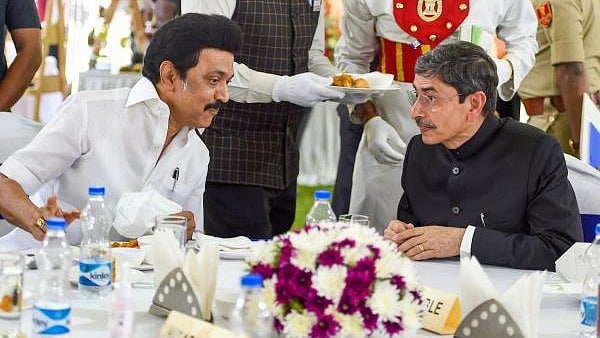
Tamil Nadu Governor R.N. Ravi being greeted by Tamil Nadu Chief Minister MK Stalin
Credit: PTI Photo
Chennai: At the core of the Supreme Court judgment, which deemed ten bills withheld by Governor R N Ravi, as having received assent, is the transfer of authority to appoint Vice-Chancellors (VCs) of state-run universities from the Governor to the Tamil Nadu government.
While the Governor will remain the chancellor of these universities, his role will now be largely ceremonial, stripped of substantive power. The state government will assume the authority to appoint VCs. Seven of the ten bills, whose status was resolved by the Supreme Court on Tuesday, pertain to the functioning of state-funded universities.
These bills replace the term "Governor" with "government" in the relevant legislation.
Seven of the 10 bills whose status have been settled by the Supreme Court on Tuesday relate to the functioning of state-funded universities. The Bills substitute the term ‘Governor’ with ‘government’. However, P Wilson, the DMK Rajya Sabha MP who was one of the key faces in the government’s battle against the Governor, said Ravi will cease to be the chancellor of universities.
The legislations relate to Madurai Kamaraj University, Bharathiar University (Coimbatore), Bharathidasan University (Tiruchirapalli), Annamalai University (Chidambaram), Alagappa University (Karaikudi),
Manonmaniam Sundaranar University (Tirunelveli), and Periyar University (Salem), among others.
The laws passed by the Assembly seek to transfer the powers of appointing VCs to 13 state-owned universities from the Governor to the state government. Both the bills cited the Gujarat University Act, 1949, Telangana Universities Act, 1991 and Karnataka State Universities Act, 2000.
On April 25, 2022 when two Bills were adopted in the Assembly, Chief Minister M K Stalin cited the example of Gujarat, ruled by the BJP for decades together, where the state government appoints VCs and not the Governor.
According to the bills, the state government will constitute a three-member committee to search for VCs and appoint them, instead of the governor. The government is currently engaged in a tussle with the governor on the composition of the search panel – while the Raj Bhavan says it should consist of four members, including a representative from UGC, the state government maintains that a three-member committee is sufficient.